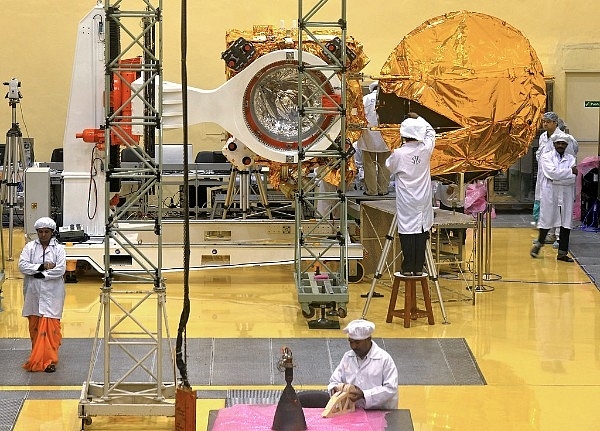Technology
ISRO Is Amping Up Private Participation In Building Its Satellites
- ISRO is planning to rope in industry players to build their satellites so they can focus on core areas.

Image Credit: Manjunath Kiran/AFP/Getty Images
In recent months, the Indian Space Research Organisation (ISRO) has been attempting to increase private participation in payload development (satellites). This is because increased privatisation will help them scale quickly and direct their focus largely on space missions and core research and development activities.
As a step in that direction, ISRO has decided to get two spare navigation satellites of its Indian Regional Navigation Satellite System (IRNSS) fleet built by private industries in the coming two years.
While ISRO will offer its skills and infrastructure, the industry will contribute the hardware for satellites that will back up the Indian regional navigation spacecraft, identified as the ‘Indian GPS’.
On 1 September, M Annadurai, Director of ISRO Satellite Centre, said ISRO will assist industry for the first project and build it by March 2017 while the second one will be solely built by industry.
The Hindu quotes Annadurai:
Annadurai said ISRO plans to invite interested companies from both public and private sectors to bid for projects. The bids are intended to be appraised and a final consortium to be identified by October to ensure that the spacecraft is ready by March 2017. The second spacecraft is aimed to be ready the subsequent year.
Earlier, on 1 September, ISRO chairman A S Kiran Kumar said after inaugurating the Bangalore Space Expo 2016 (BSX-2016) that the country is “significantly” short of capacity in space and there is a need to double the number of satellites.
He also said that ISRO is making efforts to rope in the private sector to emerge as a major force in small satellite launches.
The ISRO Chairman insisted that Indian industry should cash in on geospatial and big data analytics, which are the next big things in technology.
Support Swarajya's 50 Ground Reports Project & Sponsor A Story
Every general election Swarajya does a 50 ground reports project.
Aimed only at serious readers and those who appreciate the nuances of political undercurrents, the project provides a sense of India's electoral landscape. As you know, these reports are produced after considerable investment of travel, time and effort on the ground.
This time too we've kicked off the project in style and have covered over 30 constituencies already. If you're someone who appreciates such work and have enjoyed our coverage please consider sponsoring a ground report for just Rs 2999 to Rs 19,999 - it goes a long way in helping us produce more quality reportage.
You can also back this project by becoming a subscriber for as little as Rs 999 - so do click on this links and choose a plan that suits you and back us.
Click below to contribute.
Latest